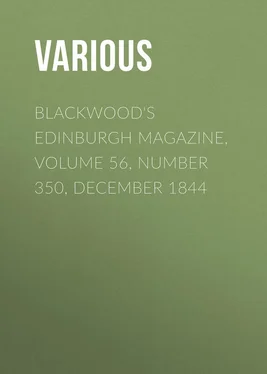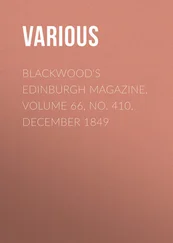Various - Blackwood's Edinburgh Magazine, Volume 56, Number 350, December 1844
Здесь есть возможность читать онлайн «Various - Blackwood's Edinburgh Magazine, Volume 56, Number 350, December 1844» — ознакомительный отрывок электронной книги совершенно бесплатно, а после прочтения отрывка купить полную версию. В некоторых случаях можно слушать аудио, скачать через торрент в формате fb2 и присутствует краткое содержание. Издательство: Иностранный паблик, Жанр: periodic, foreign_edu, Путешествия и география, на английском языке. Описание произведения, (предисловие) а так же отзывы посетителей доступны на портале библиотеки ЛибКат.
- Название:Blackwood's Edinburgh Magazine, Volume 56, Number 350, December 1844
- Автор:
- Издательство:Иностранный паблик
- Жанр:
- Год:неизвестен
- ISBN:нет данных
- Рейтинг книги:4 / 5. Голосов: 1
-
Избранное:Добавить в избранное
- Отзывы:
-
Ваша оценка:
- 80
- 1
- 2
- 3
- 4
- 5
Blackwood's Edinburgh Magazine, Volume 56, Number 350, December 1844: краткое содержание, описание и аннотация
Предлагаем к чтению аннотацию, описание, краткое содержание или предисловие (зависит от того, что написал сам автор книги «Blackwood's Edinburgh Magazine, Volume 56, Number 350, December 1844»). Если вы не нашли необходимую информацию о книге — напишите в комментариях, мы постараемся отыскать её.
Blackwood's Edinburgh Magazine, Volume 56, Number 350, December 1844 — читать онлайн ознакомительный отрывок
Ниже представлен текст книги, разбитый по страницам. Система сохранения места последней прочитанной страницы, позволяет с удобством читать онлайн бесплатно книгу «Blackwood's Edinburgh Magazine, Volume 56, Number 350, December 1844», без необходимости каждый раз заново искать на чём Вы остановились. Поставьте закладку, и сможете в любой момент перейти на страницу, на которой закончили чтение.
Интервал:
Закладка:
"The other circumstances to which your committee meant to refer, as bearing materially upon their present decision, will arise in the event of a considerable increase in the crime of forgery. Your committee called for returns of the number of prosecutions and convictions for forgery, and the offence of passing forged notes, during the last twenty years in Scotland, which returns will be found in the appendix. There appears to have been, during that period, no prosecutions for the crime of forgery; to have been eighty-six prosecutions for the offence of issuing forged promissory notes – fifty-two convictions; and eight instances in which the capital sentence of the law has been carried into effect."
This may, on the whole, be considered as an impartial report; and, as it is as well in every case to disencumber a question from specialties, we shall state here that experience has since shown that there has been no tendency whatever to the introduction of Scottish notes into England. With regard to the other special point referred to by the committee – that of forgery – such a thing as a forged bank-note is now unknown in Scotland. The evidence taken before the last committee on banks of issue in 1841, established the fact, that since the improved steel plates were brought into general use, there has never been a forgery of a note. Such being the case, it is unnecessary here to dispute the wisdom of that policy which would leave a great national institution at the mercy of a single forger. The experience of this last month alone might show how wretchedly that test would operate if applied even to the Bank of England.
Setting these specialties aside, the only possibly grounds which this committee saw for any future legislative interference were, "the increasing wealth and commerce of Scotland, the rapid extension of her commercial intercourse with England, and the circumstances which may affect that intercourse after the re-establishment of an English metallic currency." To us the first part of this reservation sounds somewhat like a threat of future bleeding when Scotland shall have become more pursy and plethoric. Nevertheless we are ready to join issue with our opponents on any of these grounds.
The report of the Lords was even more favourable; and, at the risk of being thought tedious, we cannot refrain from inserting their admirable digest of the evidence, which, for candour and clearness, might be taken as a universal model.
"With respect to Scotland, it is to be remarked, that during the period from 1766 to 1797, when no small notes were by law issuable in England, the portion of the currency in Scotland in which payments under five pounds were made, continued to consist almost entirely of notes of £1 and £1, 1s.; and that no inconvenience is known to have resulted from this difference in the currency of the two countries. This circumstance, amongst others, tends to prove that uniformity, however desirable, is not indispensably necessary. It is also proved, by the evidence and by the documents, that the banks of Scotland, whether chartered or joint-stock companies or private establishments, have for more than a century exhibited a stability which the committee believe to be unexampled in the history of banking; that they supported themselves from 1797 to 1812 without any protection from the restriction by which the Bank of England and that of Ireland were relieved from cash payments; that there was little demand for gold during the late embarrassments in the circulation; and that, in the whole period of their establishment , there are not more than two or three instances of bankruptcy. As, during the whole of this period, a large portion of their issues consisted almost entirely of notes not exceeding £1 or £1, 1s., there is the strongest reason for concluding, that, as far as respects the banks of Scotland, the issue of paper of that description has been found compatible with the highest degree of solidity ; and that there is not, therefore, while they are conducted upon their present system, sufficient ground for proposing any alteration, with the view of adding to a solidity which has been so long sufficiently established.
"This solidity appears to derive a great support from the constant exchange of notes between the different banks, by which they become checks upon each other, and by which any over-issue is subject to immediate observation and correction.
"There is also one part of the system, which is stated by all the witnesses (in the opinion of the committee very justly stated) to have had the best effects upon the people of Scotland, and particularly upon the middling and poorer classes of society, in producing and encouraging habits of frugality and industry. The practice referred to is that of cash-credits. Any person who applies to a bank for a cash-credit is called upon to produce two or more competent securities, who are jointly bound, and after a full enquiry into the character of the applicant, the nature of his business, and the sufficiency of his securities, he is allowed to open a credit, and to draw upon the bank for the whole of its amount, or for such part as his daily transactions may require. To the credit of this account he pays in such sums as he may not have occasion to use, and interest is charged or credited upon the daily balance, as the case may be. From the facility which these cash-credits give to all the small transactions of the country, and from the opportunities which they afford to persons who begin business with little or no capital but their character, to employ profitably the minutest products of their industry, it cannot be doubted that the most important advantages are derived to the whole community. The advantage to the banks who give those cash-credits arises from the call which they continually produce for the issue of their paper, and from the opportunity which they afford for the profitable employment of part of their deposits. The banks are indeed so sensible that, in order to make this part of their business advantageous and secure, it is necessary that their cash-credits should (as they express it) be frequently operated upon, that they refuse to continue them unless this implied condition be fulfilled. The total amount of their cash-credits is stated by one witness to be five millions, on which the average amount advanced by the banks may be one-third.
"The manner in which the practice of deposits on receipt is conducted tends to produce the same desirable results. Sums to as low an amount as £10 (and in some instances lower) are taken by the banks from the depositor, who may claim them at demand. He receives an interest, usually about one per cent below the market rate. It is stated that these deposits are, to a great extent, left uncalled for from year to year, and that the depositors are in the habit of adding, at the end of each year, to the interest then accrued, the amount of their yearly savings; that the sums thus gradually accumulated belong chiefly to the labouring and industrious classes of the community; and that, when such accounts are closed, it is generally for the purpose of enabling the depositors either to purchase a house or to engage in business.
"It is contended by all the persons engaged in banking in Scotland, that the issue of one-pound notes is essential to the continuance both of their cash-credits and of the branch banks established in the poorest and most remote districts. Whether the discontinuance of one-pound notes would necessarily operate to the full extent which they apprehend, in either of these respects, may perhaps admit of doubt; but the apprehensions entertained on this head, by the persons most immediately concerned, might, for a time at least, have nearly the same effect as the actual necessity; and there is strong reason to believe, that if the prohibition of one-pound notes should not ultimately overturn the whole system, it must for a considerable time materially affect it .
Читать дальшеИнтервал:
Закладка:
Похожие книги на «Blackwood's Edinburgh Magazine, Volume 56, Number 350, December 1844»
Представляем Вашему вниманию похожие книги на «Blackwood's Edinburgh Magazine, Volume 56, Number 350, December 1844» списком для выбора. Мы отобрали схожую по названию и смыслу литературу в надежде предоставить читателям больше вариантов отыскать новые, интересные, ещё непрочитанные произведения.
Обсуждение, отзывы о книге «Blackwood's Edinburgh Magazine, Volume 56, Number 350, December 1844» и просто собственные мнения читателей. Оставьте ваши комментарии, напишите, что Вы думаете о произведении, его смысле или главных героях. Укажите что конкретно понравилось, а что нет, и почему Вы так считаете.












